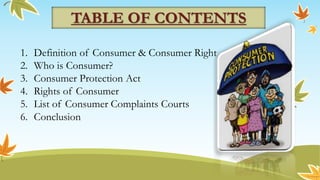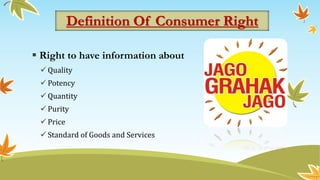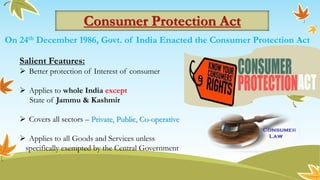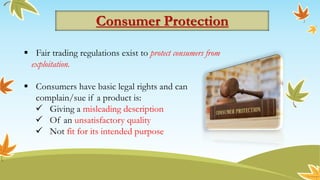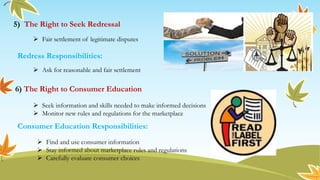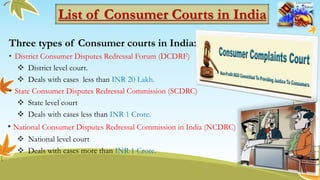Consumer rights
- 2. TABLE OF CONTENTS 1. Definition of Consumer & Consumer Right 2. Who is Consumer? 3. Consumer Protection Act 4. Rights of Consumer 5. List of Consumer Complaints Courts 6. Conclusion
- 3. Definition Of Consumer  Consumer/Customer is  Anybody who chooses Goods and Services  Spends Money to obtain them  Uses them to satisfy his or her needs
- 4.  Right to have information about  Quality  Potency  Quantity  Purity  Price  Standard of Goods and Services Definition Of Consumer Right
- 5. Who is Consumer?  Most important Visitor  Not dependent on us, But we are dependent on him.  Not interruption to our work, he is the purpose of it.  We are not doing a favour to a consumer  He is doing us a favour by giving us opportunity to service him - By Mahatma Gandhi
- 6. Consumer Protection Act On 24th December 1986, Govt. of India Enacted the Consumer Protection Act Salient Features:  Better protection of Interest of consumer  Applies to whole India except State of Jammu & Kashmir  Covers all sectors – Private, Public, Co-operative  Applies to all Goods and Services unless specifically exempted by the Central Government
- 7. Consumer Protection  Fair trading regulations exist to protect consumers from exploitation.  Consumers have basic legal rights and can complain/sue if a product is:  Giving a misleading description  Of an unsatisfactory quality  Not fit for its intended purpose
- 8. When consumers buy products they expect: “Businesses must operate within the law.“
- 10. Rights of Consumer Consumer Rights / Responsibility Right to Safety Right to Choose Right to be Informed Right to Heard Right to Seek Redressal Right to Consumer Education Right to Service
- 11. 1) The Right to Safety 2) The Right to Choose Protection against dangerous goods and services. Safety Responsibilities: ÔÇß Use products and services appropriately and for their intended purpose ÔÇß Read and follow Instructions A selection of options when purchasing goods and services Choice Responsibilities: ÔÇß Use purchasing power to promote fair business practices ÔÇß Support laws that encourage fair competition in the marketplace
- 12. 3) The Right to Informed 4) The Right to Heard Reliable sources of information about product or service performance, quality and price Informed Responsibilities: • Seek information before purchasing • Use information to make decisions about where and what to purchase • Voice complaints about products, services and business practices • Expect to have your concerns addressed by business and government Being Heard Responsibilities: • Speak up when you have a problem or concern • Support rules and regulations that are consumer friendly
- 13. 5) The Right to Seek Redressal 6) The Right to Consumer Education ÔÉò Fair settlement of legitimate disputes ÔÉò Ask for reasonable and fair settlement Redress Responsibilities: ÔÉò Seek information and skills needed to make informed decisions ÔÉò Monitor new rules and regulations for the marketplace ÔÉò Find and use consumer information ÔÉò Stay informed about marketplace rules and regulations ÔÉò Carefully evaluate consumer choices Consumer Education Responsibilities:
- 14. 7) The Right to Service ÔÉò Customers have a right to be treated in a respectful and courteous manner ÔÉò You have the right to expect fast delivery of goods or services and that they meet the standard of quality a business claims ÔÉò You have the right to be served without discrimination on the basis of your race, gender, income, or age.
- 15. Three types of Consumer courts in India: • District Consumer Disputes Redressal Forum (DCDRF)  District level court.  Deals with cases less than INR 20 Lakh. • State Consumer Disputes Redressal Commission (SCDRC)  State level court  Deals with cases less than INR 1 Crore. • National Consumer Disputes Redressal Commission in India (NCDRC)  National level court  Deals with cases more than INR 1 Crore. List of Consumer Courts in India
- 16. • Educate yourself • Before making major purchase, read Fact Sheets from the Consumer Product Safety Commission • Get product information online • Make Comparisons to find the best product or service at the best price. • Follow instructions for the safe use of products • Report unfair, unsafe, and illegal business practices. CONCLUSION Consumer Rules the Market
- 17. THANK YOU !!
Editor's Notes
- #4: Consumer is a person who buys goods or services to be used or consumed by himself/herself or by someone else on behalf of the buyer. Goods may include both consumable items or durable consumer goods. While services paid for may be transport, electricity, film-shows and the like etc.
- #5: The definition of Consumer right is ‘the right to have information about the quality, potency, quantity, purity, price and standard of goods or services’, as it may be the case, but the consumer is to be protected against any unfair practices of trade. It is very essential for the consumers to know these rights.
- #7: According to this law, everybody, including individuals, a firm, a Hindu undivided family and a company, have the right to exercise their consumer rights for the purchase of goods and services made by them. The consumer is to be protected against any unfair practices of trade. It is very essential for the consumers to know these rights.
- #16: District Consumer Disputes Redressal Forum (DCDRF) is a district level court. It deals with cases valuing up to INR 20 Lakh. State Consumer Disputes Redressal Commission (SCDRC) is a state-level court. It takes up cases valuing less than 1 crore. National Consumer Disputes Redressal Commission in India (NCDRC) is a national level court. It deals with amount more than INR 1 Crore. It is the highest court of appeal in matters related to consumer disputes in India. The presiding judges in NCDRC are retired judges of the Supreme court.
- #17: As a consumer, you have the responsibility to educate yourself. Before making a major purchase, read Fact Sheets from the Consumer Product Safety Commission. You can also get product information on the Internet. Responsible consumers make comparisons to find the best product or service at the best price. Consumers must follow the instructions given by the manufacturer for the safe use of products. You have the responsibility to report unfair, unsafe, and illegal business practices.

